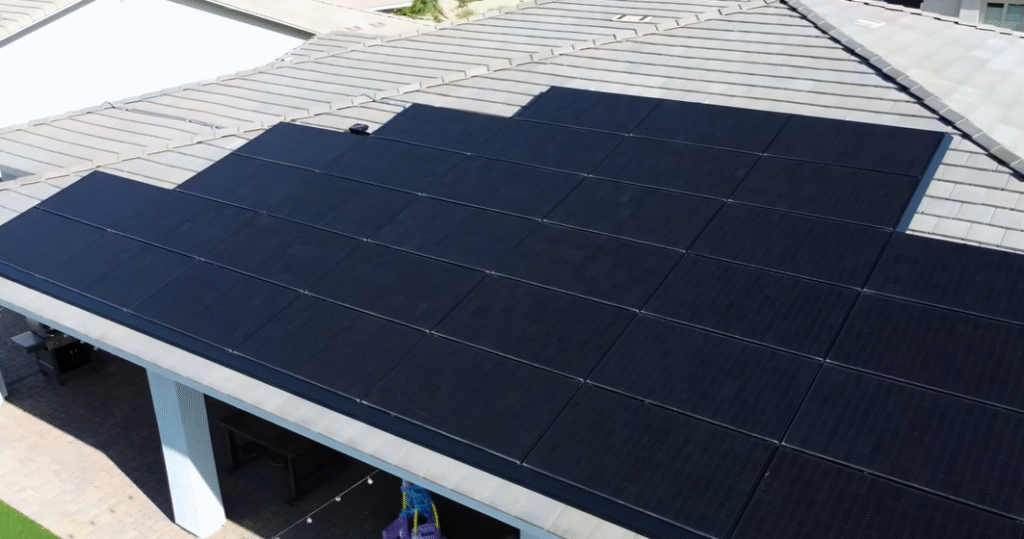As they silently shine on rooftops and transform the way that homes and cities produce energy, solar panels have emerged as an unmistakable symbol of progress. Despite their popularity, there is still a recurring query: do solar panels have any detrimental effects on your health? It’s a question that combines caution and curiosity, particularly in a time when almost every household appliance—from microwaves to smartphones—is being examined for possible health risks.
Sunlight energy is elegantly simple in its science. Through a process called the photovoltaic effect, panels use sunlight to generate electricity while producing incredibly low electromagnetic fields (EMFs). These electromagnetic fields (EMFs) remarkably resemble those generated by commonplace household appliances like hair dryers, televisions, and Wi-Fi routers. The World Health Organization has made it very clear that there is no substantial risk to human health from low-level, non-ionizing radiation from solar panels. The energy used in radiation therapy and X-rays is not the same as the energy that runs your radio.
The ominous sound of the word “radiation” contributes to some of the fear. Though not all radiation is dangerous, it evokes images of industrial hazards. Solar panel radiation is non-ionizing, which means it lacks the energy to change DNA or harm cells. Standing close to a refrigerator or even browsing through your phone can expose you to electromagnetic fields (EMFs), but solar inverters, which are devices that convert direct current to alternating current, have much lower EMF outputs.
Additionally, toxicity issues frequently surface. Silicon, glass, and aluminum—materials that are incredibly stable and frequently used in electronics, construction, and even food packaging—are the main components of modern solar panels. Trace elements like lead or cadmium may be present in some specialized panels, but they are tightly sealed within several layers to avoid exposure. During operation, panels don’t leak chemicals because of their highly effective design, which is built to keep contamination at bay even in the most adverse circumstances.
Bio Data and Professional Information
| Field | Details |
|---|---|
| Name | Andrew Giermak |
| Profession | Solar and Electrification Writer and Editor |
| Organization | Palmetto Solar, LLC |
| Education | Background in journalism and home energy systems |
| Known For | Research-based writings on solar safety and electrification |
| Expertise | Renewable energy, sustainable building practices, and solar technology |
| Location | Charlotte, North Carolina, United States |
| Reference | Palmetto Solar |

However, manufacturing and disposal do start a different discussion. Solar panels have an environmental impact during production, just like any other industrial product. However, those expenses are greatly outweighed by the long-term advantages. A single panel can provide clean energy for decades after it is put into service, offsetting the emissions from its manufacture in one to two years. In order to reduce waste, the U.S. Environmental Protection Agency makes sure that end-of-life panels are disposed of or recycled appropriately, recovering valuable materials like silicon and aluminum.
Ironically, by replacing fossil fuels, solar energy improves health outcomes worldwide. In communities close to coal or gas plants, cleaner air results in fewer hospitalizations, lower rates of cardiovascular disease, and fewer asthma attacks. The transition to renewable energy has already resulted in quantifiable drops in respiratory illnesses, according to National Institutes of Health research. Therefore, by reducing pollution that once hampered life expectancy and clouded urban skies, the simple act of installing solar panels indirectly protects human health.
Misconceptions exist regarding heat as well. Some homeowners believe that panels retain heat, increasing the temperature of the roof and possibly affecting indoor comfort. It’s the other way around. According to research from the University of California, San Diego, solar panels reduce rooftop temperatures by roughly five degrees Fahrenheit during the hottest parts of the day by acting as natural shades. For homeowners in warmer climates where cooling systems use a lot of electricity, this makes them especially advantageous.
The discussion surrounding solar and health is similar to previous discussions about new technologies—those initial waves of skepticism that greeted innovations ranging from microwaves to cell phones. Where understanding is lacking, fear tends to flourish. However, it is increasingly evident from new scientific research that solar energy has profoundly personal as well as environmental advantages. Quieter neighborhoods, cleaner air, and fewer pollutants entering our bodies and ecosystems are all benefits of cleaner energy.
